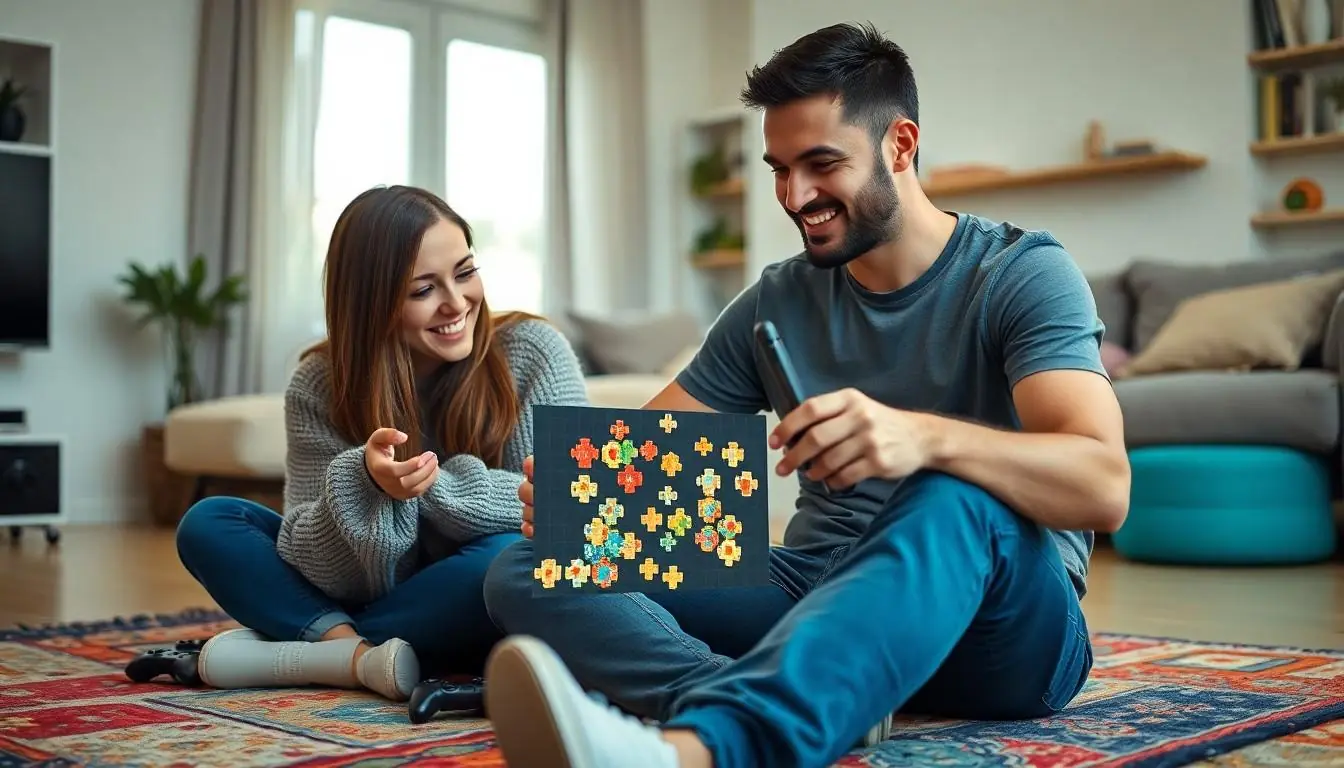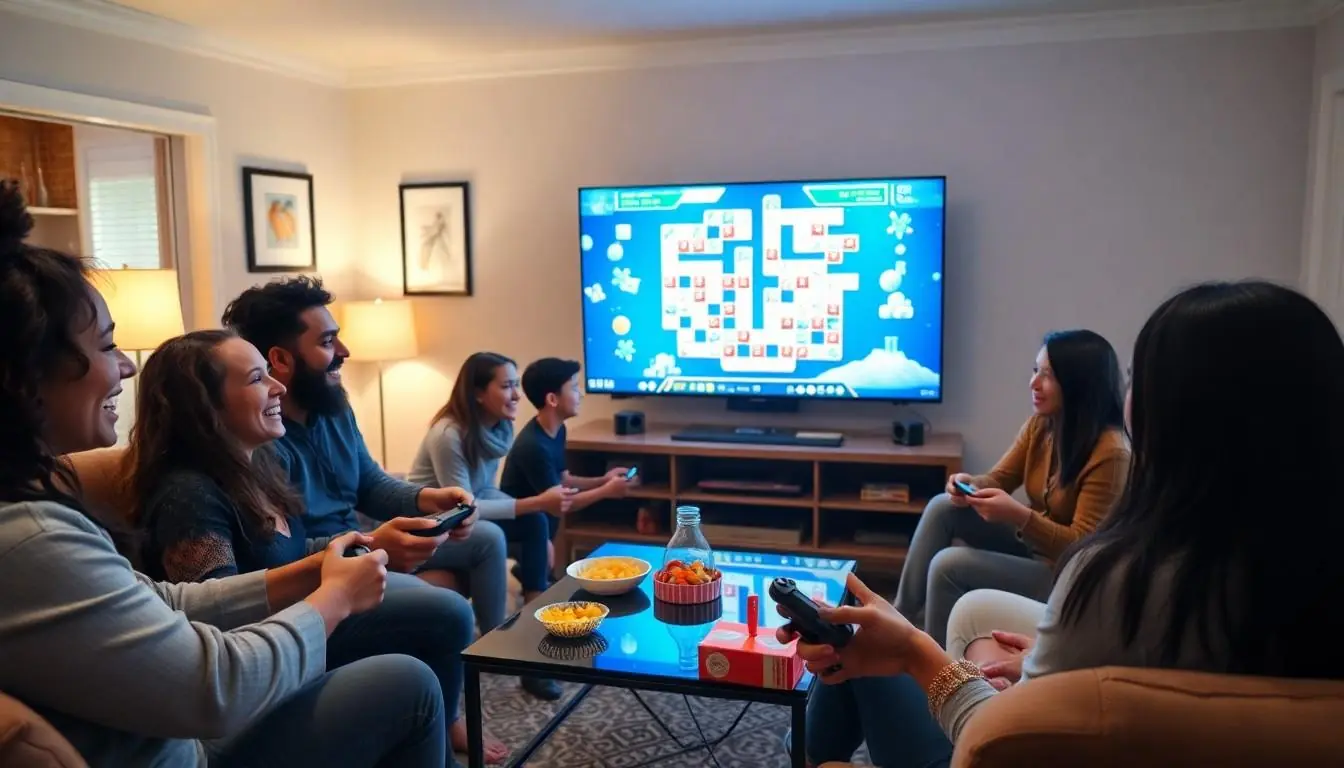In a world where solo gaming can feel a bit lonely, two-player puzzle games swoop in like superheroes, ready to save the day! These games not only challenge the mind but also bring friends and family together for some friendly competition. Whether it’s teaming up to solve a tricky conundrum or racing against each other to find the solution first, there’s something undeniably fun about tackling puzzles side by side.
Table of Contents
ToggleOverview of 2 Player Puzzle Games
Two-player puzzle games engage players in mental challenges while encouraging social interaction. These games cater to various skill levels, making them accessible to a wide audience. Cooperative puzzle games require teamwork, fostering collaboration and communication among players. Competitive puzzle games offer a different experience, emphasizing rivalry while still promoting critical thinking.
An array of options exists within the genre, including classics like Tetris and contemporary titles like Portal 2. Players explore various mechanics, from matching shapes to solving intricate mazes. Puzzle types often include logic puzzles, jigsaw puzzles, and strategy-based challenges, appealing to diverse tastes.
Many two-player puzzle games incorporate unique features that enhance the experience. Online multiplayer modes enable friends separated by distance to play together, creating opportunities for connection. Local co-op modes encourage face-to-face interaction, making the games ideal for parties or family gatherings.
Both cooperation and competition provide enjoyment in distinct ways. In cooperative scenarios, players combine their problem-solving skills, often leading to memorable shared achievements. Competitive scenarios create excitement as players strive to outperform each other while navigating the same puzzles.
Research shows that engaging in these games can improve cognitive functions, including memory and spatial awareness. Players often find themselves immersing in enjoyable gameplay while exercising their minds. The combination of social elements and mental challenges solidifies the appeal of two-player puzzle games among gaming communities.
Popular 2 Player Puzzle Games
Two-player puzzle games combine mental challenges with social interaction. They provide unique experiences that engage players, whether through cooperation or competition.
Game 1: Description and Features
Portal 2 offers a blend of humor and intelligent gameplay. Players navigate through a series of complex tests using a unique portal gun. This tool creates linked portals on flat surfaces, allowing players to teleport. Cooperative gameplay enhances the experience, requiring teamwork to solve intricate puzzles. Players must communicate effectively to progress and overcome obstacles, showcasing critical thinking and deduction skills.
Game 2: Description and Features
Overcooked! 2 transforms culinary chaos into a puzzle-solving adventure. Teams must prepare, cook, and serve food orders under tight time constraints. Each kitchen presents unique challenges, like moving platforms and hazardous environments. Coordination and planning are essential, as players juggle tasks to successfully run the kitchen. The game emphasizes teamwork, making it enjoyable for friends and family looking for fun and chaotic gameplay.
Game 3: Description and Features
Lovers in a Dangerous Spacetime takes players on a colorful journey through space. Teams control a spaceship filled with adorable characters, working together to fight off enemies and rescue space bunnies. Each player occupies different stations within the ship, managing weapons, shields, and navigation. Effective communication is crucial, as players must quickly adapt their strategies to survive various levels. This game combines action and puzzle-solving, providing a thrilling cooperative experience.
Benefits of Playing 2 Player Puzzle Games
Two-player puzzle games offer numerous benefits that go beyond entertainment. Engaging in these games enhances various cognitive and social skills.
Enhancing Problem-Solving Skills
Playing two-player puzzle games sharpens critical thinking and analytical abilities. Each puzzle requires players to evaluate different strategies, encouraging them to think creatively and logically. Players learn to assess options and experiment with solutions collaboratively. These experiences build resilience in facing challenges, transforming setbacks into learning opportunities. Research highlights that regular exposure to puzzles boosts memory retention and spatial awareness. Solving intricate problems together can lead to more effective teamwork in real-life scenarios and improve overall adaptability.
Strengthening Relationships
Two-player puzzle games provide an excellent platform for deepening connections. Shared experiences foster communication, cooperation, and camaraderie between players. Engaging with a partner allows individuals to understand different perspectives and approaches to problem-solving. Fun moments arise from humorous failures, helping to create lasting memories. Regular gameplay builds trust, developing a sense of teamwork that extends beyond the screen. The satisfaction of achieving a goal together enhances emotional bonds, making more significant social connections, whether between friends or family members.
Tips for Choosing the Right Game
Consider the gameplay mechanics that suit both players. Cooperative games encourage collaboration and communication, while competitive games enhance rivalry and strategy. Think about the preferred style of play. If both players enjoy working together, opt for titles like “Portal 2” or “Overcooked! 2.” These games provide engaging challenges that require teamwork.
Evaluate the skill levels of the participants. Selecting games that cater to varying abilities ensures an enjoyable experience. For mixed skill levels, games with adjustable difficulty settings can be beneficial. Also, explore options with tutorials or guided gameplay.
Assess the time commitment. Some games offer quick sessions ideal for short play periods, such as “Lovers in a Dangerous Spacetime.” Others require longer durations, perfect for extended gaming sessions. Make sure to pick a game that aligns with the time available.
Explore the unique features of each game. Titles with local co-op modes allow for face-to-face interaction, fostering a social atmosphere. Online multiplayer options expand the accessibility for remote play, promoting engagement across distances.
Research player reviews and recommendations. Insights from fellow gamers can highlight diverse experiences and preferences. Platforms like Steam or gaming forums provide valuable feedback on game quality and enjoyment levels.
Finally, prioritize fun and social interaction. The primary goal of these games is to enjoy time spent together. Picking a game that encourages laughter and engagement can enhance the overall gaming experience, reinforcing connections among players.
Conclusion
Two-player puzzle games offer a unique blend of mental challenges and social interaction that enrich the gaming experience. They bring friends and family together, fostering teamwork and friendly competition while enhancing cognitive skills. The variety within this genre ensures there’s something for everyone, whether players prefer cooperative adventures or competitive showdowns.
As players engage in these games, they not only improve their problem-solving abilities but also strengthen their relationships. The laughter and shared victories create lasting memories that deepen connections. With countless titles available, choosing the right game can lead to hours of fun and meaningful engagement. Embracing two-player puzzle games is a fantastic way to enjoy quality time while stimulating the mind.




